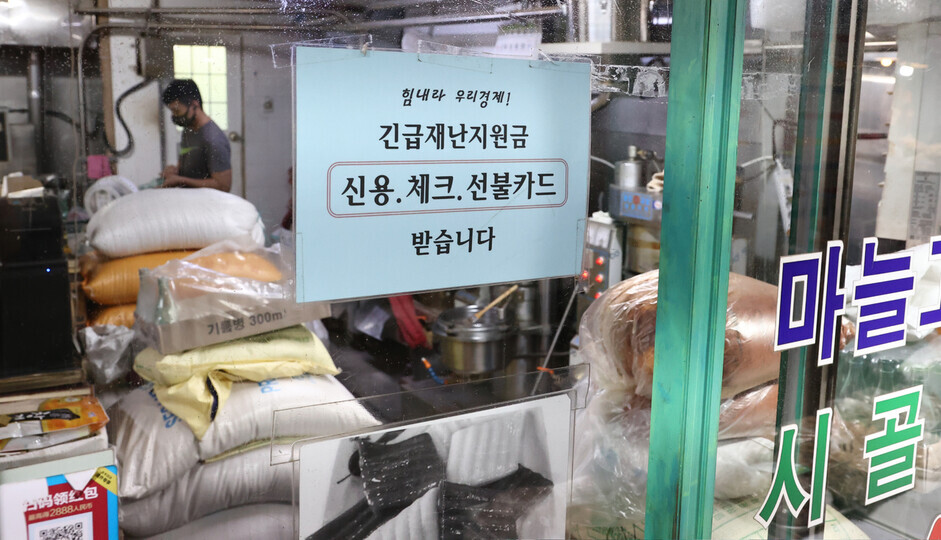hankyoreh
Links to other country sites 다른 나라 사이트 링크
Disease control experts say authorities need to devise “K-disease control 2.0” measures

Two disease control specialist societies are calling for South Korea to develop a sustainable “2.0” disease control system for the COVID-19 pandemic, contending that the current social distancing approach has been ineffective.
The calls from the Korean Society for Preventive Medicine (KSPM) and the Korean Society of Epidemiology (KESPI) come amid a fourth wave of the virus-driven by its Delta variant, which has seen new daily confirmed cases upwards of 2,000 for days on end.
In a statement issued Thursday, a joint COVID-19 countermeasures committee formed by the KSPM and KESPI said it had “reached the conclusion that the current situation cannot be overcome through the current social distancing regime and disease control policies.”
“While social distancing may have been effective early on in the COVID-19 [pandemic], objective data now show that it is currently ineffective relative to the social costs incurred,” it added.
The committee also said that the “so-called “K-disease control system centering on tracing, testing, and epidemiological studies is reaching the brink of collapse due to a reliance on dedication and sacrifice by health and medical workers, without any addition of staffing or resources as the pandemic has dragged out and grown in scale.”
“We need to prepare a sustainable ‘2.0’ version of K-disease control,” it said..
It went on to say that the current social distancing approach “should be supplemented to increase its fairness and effectiveness.”
“We urgently need to add more disease control staff and resources to dramatically increase our capacities for contact tracing and management, which is a basic principle of ‘K-disease control,’” it said.
“The government needs to focus more on increasing its capacities for treating critical patients, devote its full energies to adequately expanding vaccine supplies, and work to ensure that the public proactively undergoes vaccination.”
The committee also said it “suggests and urges participation in transitioning from disease control based on administrative regulations to a citizen-participation model of disease control.”
“Without participation and cooperation from the public, the disease control system is unsustainable,” it noted.
“We urge [authorities] to make use of the world’s highest level of network infrastructure and information and communications technology [in South Korea] to develop a platform that allows citizens to participate voluntarily while protecting their personal information,” it said.
Hong Yun-chul, director of the Seoul National University public health and medicine promotion center and a participant in the committee, said, “The public, the disease control personnel, and medical workers are all reaching their limits over the past 20 months that we’ve been battling with COVID-19.”
“At a time when there’s been an exponential increase in the number of people such as small business owners and self-employed people whose very livelihoods are in danger after their sacrifices for the safety of all of society and the community, we need a larger societal consensus and resolution where civil society takes part voluntarily in disease control activities with a spirit of solidarity, cooperation, and sharing the burden,” he added.
Park Hyang, director of the disease control supervision team for the Central Disaster Management Headquarters, commented on the committee’s statement in a briefing Thursday morning.
“We are examining and preparing for a transition in our disease control system in the larger scheme of things based on expert opinions on the ‘with COVID-19’ approach and the examples of other countries that have achieved vaccination ahead of us,” she said.
“We’ll begin relaxing social distancing and developing a direction once the vaccination rate is at least 70% or higher,” she added.
By Cho Ha-yan, staff reporter
Please direct comments or questions to [english@hani.co.kr]

Editorial・opinion
![[Column] Season 2 of special prosecutor probe may be coming to Korea soon [Column] Season 2 of special prosecutor probe may be coming to Korea soon](https://flexible.img.hani.co.kr/flexible/normal/500/300/imgdb/original/2024/0426/3317141030699447.jpg) [Column] Season 2 of special prosecutor probe may be coming to Korea soon
[Column] Season 2 of special prosecutor probe may be coming to Korea soon![[Column] Park Geun-hye déjà vu in Yoon Suk-yeol [Column] Park Geun-hye déjà vu in Yoon Suk-yeol](https://flexible.img.hani.co.kr/flexible/normal/500/300/imgdb/original/2024/0424/651713945113788.jpg) [Column] Park Geun-hye déjà vu in Yoon Suk-yeol
[Column] Park Geun-hye déjà vu in Yoon Suk-yeol- [Editorial] New weight of N. Korea’s nuclear threats makes dialogue all the more urgent
- [Guest essay] The real reason Korea’s new right wants to dub Rhee a founding father
- [Column] ‘Choson’: Is it time we start referring to N. Korea in its own terms?
- [Editorial] Japan’s rewriting of history with Korea has gone too far
- [Column] The president’s questionable capacity for dialogue
- [Column] Are chaebol firms just pizza pies for families to divvy up as they please?
- [Column] Has Korea, too, crossed the Rubicon on China?
- [Correspondent’s column] In Japan’s alliance with US, echoes of its past alliances with UK
Most viewed articles
- 1AI is catching up with humans at a ‘shocking’ rate
- 2‘We must say no’: Seoul defense chief on Korean, USFK involvement in hypothetical Taiwan crisis
- 3[Column] Season 2 of special prosecutor probe may be coming to Korea soon
- 4Division commander ordered troops to enter raging flood waters before Marine died, survivor says
- 5Is Japan about to snatch control of Line messenger from Korea’s Naver?
- 6Korea protests Japanese PM’s offering at war-linked Yasukuni Shrine
- 7Is N. Korea threatening to test nukes in response to possible new US-led sanctions body?
- 8One Hyundai worker suffers through 16 piecemeal contracts in 23 months
- 9[Photo] Migrant workers rally for labor rights
- 10Korea once again ranks near bottom of list for gender parity, report shows